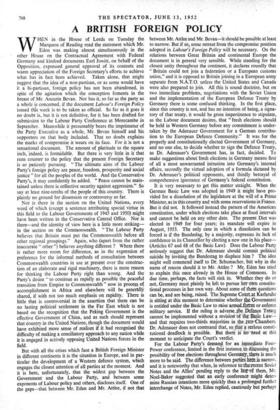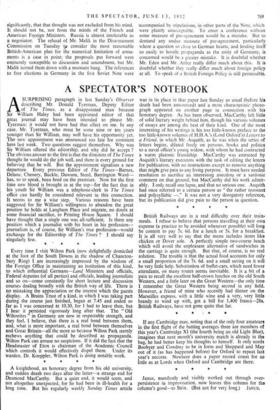A BRITISH FOREIGN POLICY
WHEN in 'the House of Lords on Tuesday the Marquess of Reading read the statement which Mr. Eden was making almost simultaneously in the other House on the Contractual Agreement with Federal Germany and kindred documents Earl Jowitt, on behalf of the Opposition, expressed general approval of its contents and warm appreciation of the Foreign Secretary's efforts to achieve what has in fact been achieved. Taken alone, that might suggest that the idea of a non-partisan, or as some would have it a bi-partisan, foreign policy has not been abandoned, in spite of the agitation which the conception foments in the breast of Mr. Aneurin Bevan. Nor has it, so far as the party as a whole is concerned, if the document Labour's Foreign Policy issued this week is to be taken as official. So far as it goes it no doubt is, but it is not definitive, for it has been drafted for submission to the Labour Party Conference at Morecambe in September. Meanwhile it presumably bears the imprimatur of the Party Executive as a whole, Mr. Bevan himself and his supporters on that body included. That no doubt explains the marks of compromise it wears on its face. For it is not a sensational document. The amount of platitude to the square inch, indeed, is formidable. But there is very little in it that runs counter to the policy that the present Foreign Secretary is so patiently pursuing. "The ultimate aims of the Labour Party's foreign policy are peace, freedom, prosperity and social justice" for all the peoples of the world. And the Conservative Party's, it may confidently be added. "Peace cannot be main- tained unless there is collective security against aggression." So say at least nine-tenths of the people of this country. There is plainly no ground for dissension or controversy so far.
Nor is there in the section on the United Nations, every word of which (except a sentence attributing special virtue in this field to the Labour Governments of 1945 and 1950) might have been written in the Conservative Central Office. Nor is there—and the identity of view here is a little more striking— in the section on the Commonwealth. "The Labour Party believes that Britain must put the Commonwealth before all other regional groupings." Again, who (apart from the rather inaccurate "other ") believes anything different ? Where there is rather more room for difference, as in the expression of preference for the informal methods of consultation between Commonwealth countries in use at present over the construc- tion of an elaborate and rigid machinery, there is more reason for thinking the Labour Party right than wrong. And the Party's desire "to continue as rapidly as possible the peaceful transition from Empire to Commonwealth" now in process_ of accomplishment in Africa and elsewhere will be genera* shared, if with not too much emphasis on rapidity; There is little that is controversial in the assertion that there can be no lasting political settlement in the Far East which is not based on the recognition that the Peking Government is the effective Government of China, and as such should represent that country in the United Nations, though the document would have exhibited more sense of realism if it had recognised the difficulty of making a conciliatory approach to any nation while it is engaged in actively opposing United Nations forces in the field.
But with all the crises which face a British Foreign Minister in different continents it is the situation in Europe, and in par- ticular the development of a Western defence system, which engages the closest attention of all parties at the moment. And it is here, unfortunately, that the widest gap between., the Government and the Labour Party, and between some exponents of Labour policy and others, discloses itself. One of the gaps—that between Mr. Eden and Mr. Attlee, if not that between Mr. Attlee and Mr. Bevan—it should be possible at least to narrow. But if sol some retreat from the compromise position adopted in Labour's Foreign Policy will be necessary. On the relations between Great Britain and continental Europe the document is in general very sensible. While standing for the closest unity throughout the continent, it declares roundly that "Britain could not join a federation or a European customs union," and it is opposed to Britain joining in a European army separate from N.A.T.O. unless the United States and Canada were also prepared to join. All this is sound doctrine, but on two immediate problems, negotiations with the Soviet Union and the implementation of the European Defence Treaty by Germany there is some confused thinking. In the first place, since this country is not, and has no intention of being, a signa- tory of that treaty, it would be gross impertinence to stipulate, as the Labour document desires, that "fresh elections should be held in Western Germany before any commitment is under- taken by the Adenauer Government for a German contribu- tion to the European Defence Community." It was for the properly and constitutionally elected Government of Germany, and no one else, to decide whether to sign the Defence Treaty, as Dr. Adenauer's Government has, in fact, decided. To make suggestions about fresh elections in Germany means first of all a most unwarranted intrusion into Germany's internal affairs, secondly the virtual adoption of a formula dictated by Dr. Adenauer's political opponents, and thirdly betrayal of comprehensive ignorance of Germany's federal constitution.
It is very necessary to get this matter straight. When the German Basic Law, was adopted in 1949 it might have pro- vided for a dissolution of the legislature at the will of a Prime Minister, as in this country and with some reservations in France. But it did not. It followed instead the pattern of the American constitution, under which elections take place at fixed intervals and cannot be held on any other date. The present Diet was elected in 1949 for four years; its mandate will expire in August, 1953. The only case in which a dissolution can be forced is if the Bundestag, by a majority, expresses its lack of confidence in its Chancellor by electing a new one in his place— (Articles 67 and 68 of the Basic Law). Does the Labour Party seriously suggest that Dr. Adenauer should commit political suicide by inviting the Bundestag to displace him..? The idea might well commend- itself to Dr. Schumacher, &it why in the name of reason should it to Mr. Attlee ? Mr, Eden has tried to explain this once already in the House of Commons. In due time, perhaps, the facts will sink in. Whether_ they do or not, Germany must plainly be left to pursue lier -own constitu- tional processes in her own way. About some of them questions can be, and are being, raised. The Supreme Conitat Karlsruhe is sitting at this moment to determine whether the. Government is entitled under the Basic Law to raise arm,--.W..ths or enforce military service. If the ruling is adveriejlie.Ifefence Treaty cannot be implemented without a revisioirot tht ItiOc Law— and that requires two-thirds majorities in the_Mr-Chambers. Dr. Adenauer does not command that, so_that a serious consti- tutional deadlock is possible. But that' is–no–nted at this moment to anticipate the Court's verdict.
For the Labour Party's demand for an iqungliate Four- Power conference, limited in the first instance_tatiteussing the possibility of free elections throughout Gemara; there is much more to be said. The difference between parties &leis narrow, and it is noteworthy that when, in reference talltm=nt Soviet Notes and the Allies' pending reply to the arsr-Of them, Mr. Noel-Baker suggested that an early conference' might deter. mine Russian intentions more quickly than a prolonged further interchange of Notes, Mr. Eden replied, cautiously but perhaps significantly, that that thought was not excluded from his mind. It should not be, nor from the minds of the French and American Foreign Ministers. Russia is almost intolerable as a negotiator. The refusal of Mr. Malik in the Disarmament Commission on Tuesday to consider the most reasonable British-American plan for the numerical limitation of arma- ments is a case in point; the proposals put forward were eminently susceptible to discussion and amendment, but Mr. Malik turned them down with a resonant bang. The references to free elections in Germany in the first Soviet Note were accompanied by stipulations, in other parts of the Note, which were plainly unacceptable. To enter a conference without some measure of pre-agreement would be a mistake. But to demand any undue measure of pre-agreement, particularly where a question so close to German hearts, and lending itself so easily to hostile propaganda as the unity of Germany, is concerned would be a greater mistake. It is doubtful whether Mr. Eden and Mr. Attlee really differ much about this. It is doubtful whether they really differ much about foreign policy at all. To speak of a British Foreign Policy is still permissible.



































 Previous page
Previous page